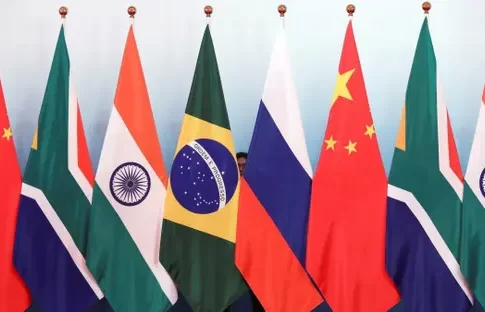In a pivotal assembly aimed at countering the economic impact of aggressive US trade policies, senior diplomats from the BRICS nations have gathered in Rio de Janeiro, Brazil. This strategic meeting comes at a crucial juncture for the global economy, following the International Monetary Fund’s recent downward revision of growth forecasts due to President Donald Trump’s sweeping new tariffs.
As the talks unfold, Brazil’s BRICS representative Mauricio Lyrio revealed that the diplomats are drafting a joint declaration to underscore “the centrality and importance of the multilateral trading system.” This initiative reflects the group’s commitment to maintaining stability in global trade amidst increasing protectionist measures from the US administration.
Since its inception in 2009, the BRICS grouping has grown to include Iran, Egypt, Indonesia, Ethiopia, and the United Arab Emirates, now representing nearly half of the world’s population and 39% of global GDP. This expansion underscores the increasing economic clout and collaborative potential of the bloc in the face of unilateral trade actions by the US.
In response to the US’s blanket 10% tariff on numerous countries—and significantly higher levies on China—BRICS nations are exploring ways to boost economic resilience. Notably, Beijing has imposed retaliatory tariffs of up to 125% on US goods. Russian Foreign Minister Sergei Lavrov, in a conversation with Brazil’s O Globo newspaper, highlighted plans to “increase the share of national currencies in transactions,” while acknowledging that a unified BRICS currency remains a distant prospect.
Experts suggest that the BRICS meeting could influence broader economic strategies beyond immediate trade concerns. Dr. Amina Hassan, an economist specializing in international trade, remarked, “The BRICS nations’ proactive engagement could serve as a counterbalance to US economic pressures, potentially reshaping trade dynamics in regions like Africa and the Middle East.”
As the foreign ministers, including Russia’s Sergei Lavrov and China’s Wang Yi, engage in these critical discussions, the BRICS meeting sets the stage for a leaders’ summit in July. The outcomes of these talks could pave the way for stronger economic alliances and a more diversified global trade framework, mitigating the adverse impacts of protectionism.
By presenting a united front, the BRICS nations are not only defending their economic interests but also advocating for a more cooperative and balanced global trade system, setting the tone for future engagements in an increasingly multipolar world.


